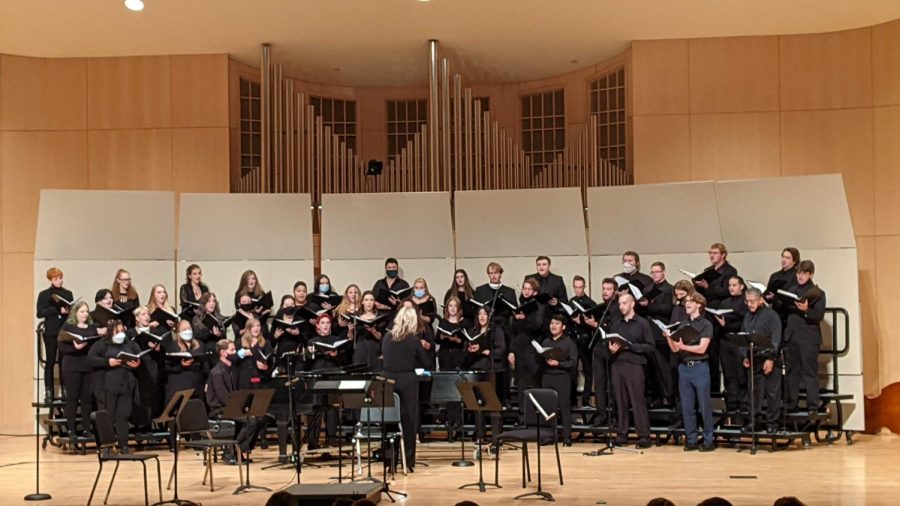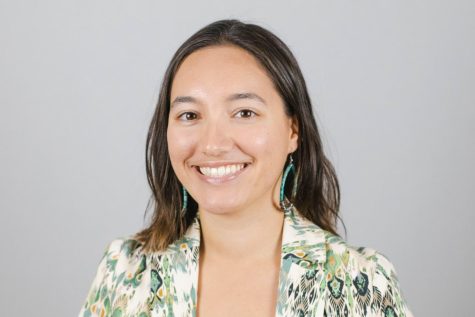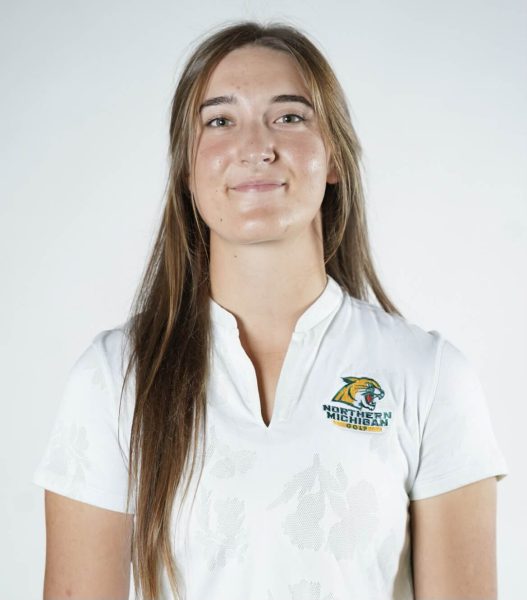Choir concert honors Matthew Shepard’s legacy, shifts attitudes concerning hate crimes
NMU choir students to perform Considering Matthew Shepard by Craig Hella Johnson, capture Shepard’s story within his life, death, legacy
CHORAL PERFORMANCE — NMU choirs perform at a past choir performance in the Reynolds Recital Hall. Their upcoming performance, Considering Matthew Shepard, will be an hour and a half long and deal with the emotional story of Matthew Shepard.
February 20, 2023
In 1998, University of Wyoming student Matthew Shepard, a 21-year-old gay man, was attacked by two other young men, tied to a fence post and left to die. He ended up dying five days later in a hospital from his wounds, and his death sparked major media attention concerning hate crimes.
“His death changed the legislation in this country,” said Erin Colwitz, associate professor of music and director of choirs at NMU. “It was a huge shift in things and the way we thought about things.”
Twenty-five years after Shepard’s murder, Colwitz and her choir students will be performing Considering Matthew Shepard, a three-part composition by Craig Hella Johnson that captures the story of Shepard’s life, death and legacy. The concert will be on Tuesday, Feb. 21 at 7:30 p.m. in Reynolds Recital Hall and is free to attend.
Both choirs, the NMU Arts Chorale and University Choir, will be collaborating on this work, which was originally written for a professional choir in 2016. It was put into wide release in 2019 and deals with intense themes that advise parental discretion.
“[Johnson] is a gay man. He’s also a Lutheran and reconciling the two, he’s been very public about how that was a difficult struggle for him to be a gay man in the church,” Colwitz said. “Matthew Shepard died when I was 22 and [Johnson] is a little older than me, so this was pretty pivotal for our 20s … Especially being a musician, I knew a lot of gay men who were not allowed to be out … so this was a big deal, and pretty upsetting for a lot of people.”
Colwitz had previously conducted excerpts from Considering Matthew Shepard prior to tackling the whole hour-and-a-half-long performance but decided this was the year to try the whole thing.
“This is a piece that I’ve been wanting to do for a couple of years,” Colwitz said. “I’ve done pieces from it, but I’ve never done the whole thing … I just finally decided, ‘let’s schedule a time to do it.’ I had lots of students that were asking me if we could schedule it.”
February was the best time for the performance for Colwitz, in terms of scheduling and other concerts, but that only gave the performers around a month to learn, rehearse and perform.
Colwitz spent around 15 hours a week coaching the choirs and soloists but said each choir member likely dedicated 20 hours a week to their choir, sectional and individual rehearsals.
Kassidy Bush, a first-year secondary music education major, sings alto in the Arts Chorale and has a solo within one of the pieces. For her, the music and story have significantly shaped her semester so far.
“As far as my solo, I’ve been spending a lot of time in my personal voice lessons with my voice teacher on that song, as well as just time in a practice room on my own,” Bush said. “A significant portion of each day and all of my week has certainly gone into this work, and that’s just the practicing part, not the thinking about it and digesting it and processing it.”
Before diving into the musical aspects of Considering Matthew Shepard, Colwitz and the choirs dedicated time to learning the history behind Shepard’s murder and the broader context for the piece they were learning.
“A lot of people didn’t even know who he was,” Colwitz said. “They weren’t even born yet when he died, so that was an education just to find out who Mathew Shepard was and why he became such a symbol for hate crimes.”
The piece itself covers Shepard’s story in great detail, including background on Shepard’s childhood, excerpts from his personal journal, interviews and writings from his parents and newspaper reports and poems, among Johnson’s own words.
Considering Matthew Shepard is an oratorio composition that contains many solos, choral passages and interludes written in musical styles across the board. A string quartet, clarinet player, pianist, percussionist, two guitar players and around 60 student vocalists will perform songs that include characteristics of pop, blues, jazz, church hymns and even country music throughout the hour-and-a-half-long concert.
It is also performed without an intermission.
“There are no breaks, no intermission, so that’s a big deal,” Colwitz said. “People who would want to get up probably shouldn’t. I even have it in the program that says, ‘don’t move around because there’s just so much going on and the singers need to be very focused.’ But it’s an hour and a half and [Johnson] intended to do it with no intermission, no breaks.”
Johnson wrote Considering Matthew Shepard in three parts: Prologue, Passion, Epilogue.
The Prologue explains the story of who Shepard was and includes the song “Ordinary Boy.” It quotes Shepard’s mother and his personal journal as the audience learns about his love for jogging, pasta and writing letters.
“He likes everyday, normal things which really humanizes him in a lot of ways and that’s hard to hear sometimes,” Colwtiz said. “We’ve kind of made him a martyr in a lot of ways, but he really was just a normal dude.”
For those in the choir, reading through pieces like these was challenging at first.
“The first time we sang through ‘Ordinary Boy,’ I had to stop myself from crying three times,” Bush said. “He wears braces and there’s a line in particular within all of this … about how he would write letters and poems and put them in people’s mailboxes that he knew until he learned it was illegal. It’s a moment within the music where you’re supposed to laugh, it’s like ‘oh my god, that’s so cute.’ He’s just human and wonderful and individual and the amount of times where it just got to me, it was too much.”
The Passion is the central part of the composition and extensively discusses Shepard’s death. Colwitz likens the movement to the Passion of Jesus Christ, where he was called to be killed and crucified.
There are multiple movements about Shepard dying as he is left tied to the fence post, and the fence post becomes a character within the retelling of the story.
“The fence post is singing about how he tried to save him and he held onto him like a mother,” Colwitz said. “That really gave us a run for our money the first time we sang it and we are still working through the emotions of it all, but I think [the students] have gotten to a point now where they have heard it enough that they have stopped crying and now we are just trying to do it justice.”
Throughout the piece, different students from the choir deliver recitations and give further details and context to the story. One of Bush’s lines is “Matthew was left tied to the fence for almost 18 hours.”
While different students embody different roles throughout the concert, Bush emphasizes that the characters are not played by the same person each time.
“At the beginning of the score, it is written that all of the soloists have to come from the choir because it’s important that these people could be anybody,” Bush said. “That is a very important message within the entire work is [that] Matthew could have been anyone. The two boys who murdered him could have been anyone. It could be all of us, any of us.”
That theme is highlighted again in the Epilogue with the song “All of Us” which reminds the audience that Shepard could have been anyone, but there are still ways to move forward with our grief. The ending is one of hope, in a story of hurt and tragedy.
“[Johnson] uses the fence post as a symbol, in many ways, which is that we meet at the fence post and then we move towards the horizon,” Colwitz said. “We meet here, we meet at our pain and our grief, and we acknowledge our pain and our sadness, and then we move on and we make the world a better place with that in mind.”
For Colwitz, all of the symbolism and emotional themes have made this piece one of the most challenging to conduct. She has spent hours studying the score and trying to process it all.
“I have conducted a lot of major works in my career, but this is probably the most difficult. Not because of the music per se … but wrapping my brain around what each of these movements should sound like and the message that each movement needs to convey and how it fits dramatically into the larger piece,” Colwitz said. “Emotionally, it’s pretty heavy but beyond that, as an artist would look at it, I’m trying to get everything across that the composer wants to get across.”
Colwitz and the choirs hope that students and community members will take time to attend the concert and come together for what will likely be an emotional evening. Bringing a pack of tissues is recommended.
“I think specifically with Marquette being a college town, it has a lot of similarities with Laramie, which is where the University of Wyoming is, which is where Mathew attended,” Bush said. “I think it’s important to remind the community that these issues are still prevalent, that on this college campus, we still deal with things like homophobia and all these different types of hate, and while they might not manifest in large protests or screaming on the street, they still affect students’ day to day lives. They can still be very harmful and very hurtful.”


























